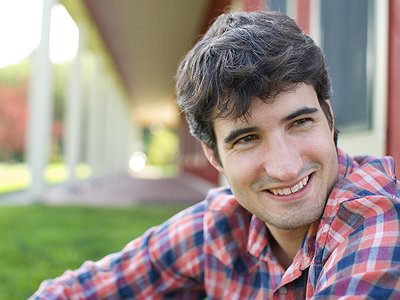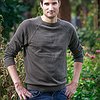Part 1
Name: Jacob Cooper
Nationality: American
Occupation: composer/ professor
Current Release: Terrain on New Amsterdam
Recommendations: Yukiko Montoya’s The Lonesome Bodybuilder. These stories, recently translated into English, are grotesque in their beauty and divine in their horror / Guido van der Werve’s Nummer Acht: Everything is Going to Be All Right
Website/Contact: You can buy music from Jacob's Bandcamp page, and visit his website where you can keep up to date with releases and projects at jacobcoopermusic.com
When did you start writing/producing music - and what or who were your early passions and influences? What is it about music and/or sound that drew you to it?
I started writing music during college when I was 21 years old. I was actually primarily a Geology major, but I had played the trumpet since an early age, and got increasingly involved in learning about music, eventually taking a composition course my senior year. In that introductory course, I remember being blown away by the minimalist composers (Reich and Glass), and soon got into the Bang on a Can composers, whom to this day I consider significant role models and mentors.
At the most basic level, I was drawn to music simply for the sense of euphoria that listening to it offered me. This sense especially developed in high school, but I never thought I could create music myself until I was gradually led down that path through college courses in music theory and model composition.
For most artists, originality is first preceded by a phase of learning and, often, emulating others. How would you describe your own development as an artist and the transition towards your own voice? What is the relationship between copying, learning and your own creativity?
For the first couple years of graduate school, I forced myself to experiment with a lot of different styles. Eventually, though, I accepted my minimalist tendencies, learning not to be afraid to let my pieces develop slowly. I also felt more freedom to embrace electronic music and production, which allowed me to explore the timbres and techniques that now form the backbone of my compositional style.
From my first days of writing music until now, I usually begin a piece by imitating something I like in another work. I think I have just gotten better at having that point of departure morph into something that is wholly my own.
What were your main compositional- and production-challenges in the beginning and how have they changed over time?
I mentioned above that it took me a while to develop the confidence to let my music linger, and to recognize that production could actually be a significant part of composition. In my classical/academic training, no one was so snobby as to fully discount the importance of the studio, but there wasn’t really anyone around to show me how my music could benefit from production, so I came to that gradually and with some trepidation.
Starting a piece has always been a challenge, it takes me a painstakingly long time to find a sonic idea worth pursuing, even when I am working from a pre-existing work, and lately I have realized that. While not as mentally frustrating, the last stages of composition crawl by as well. At that point, I am working to perfect things, but that I nevertheless feel like I need to make. It is occurred to me that these days my productivity on a piece follows what science-types call an S-curve: steady achievement in the middle, incremental progress at either end.
What was your first studio like? How and for what reasons has your set-up evolved over the years and what are currently some of the most important pieces of gear for you?
In a sense, my first “studio” was just the music notation software Finale. Not being a pianist, I never really felt like I could compose, until a friend loaned me Finale, and I realized that even a dolt like me could create music. I have primarily continued to be a software guy to this day, aside from some basic microphones, just expanding my home studio through virtual instruments and plugins. But getting decent monitors and treating the studio with fiberglass panels, etc., was a big step in getting me to be a better listener.
How do you make use of technology? In terms of the feedback mechanism between technology and creativity, what do humans excel at, what do machines excel at?
Most importantly for my music, humans excel at individual expression and creativity. I rely on human performers to bring a sense of intimacy that technology cannot offer in itself. Increasingly, I also rely on performers when workshopping a piece to sing/play material back to me and bring their own ideas to it, or to offer me advice based on their own mastery.
Machines excel at precision. I rely on incredibly gradual automation of a filter. Technology is also significant for me in how it allows me to explore novel timbres sounds that cannot be produced by humans or acoustic instruments. While I rely on humans to make music sound personal and relatable, I sometimes process human sounds with machines to achieve the opposite. A simple example of this is pitch-shifting a vocal line to render it strange or uncanny.
Production tools, from instruments to complex software environments, contribute to the compositional process. How does this manifest itself in your work? Can you describe the co-authorship between yourself and your tools?
The word “co-authorship” is interesting here, since I certainly think of performers and other collaborators as co-authors, but I have never extended this idea to technology though it is of course essential for my compositional process. I generally rely on software processing of audio to help me sketch an initial idea, to create a sound world that I like and then also to keep the music interesting through gradual change.
Collaborations can take on many forms. What role do they play in your approach and what are your preferred ways of engaging with other creatives through, for example, file sharing, jamming or just talking about ideas?
Collaboration is a huge and growing part of my compositional process. As mentioned above, I rely on performers to workshop material with me. This allows me to place recordings into a project session and process them sonically; and it also gives performers a chance to give me specific feedback on how playable or idiomatic a passage is. More and more, I find myself adhering to the adage that one should write for performers, not instruments.
For vocal works, I usually collaborate with a poet. All the lyrics are theirs, but they are developed through a back-and-forth exchange where we send each other sketches and drafts throughout. At the beginning of the compositional process, we focus on finding the general aesthetic of the text; next we develop the overall form; and by the end, I request specific changes to the number of lines or number of syllables to better suit the composition. For me, the text brings an additional vibrancy to the music when it comes to life alongside it.






